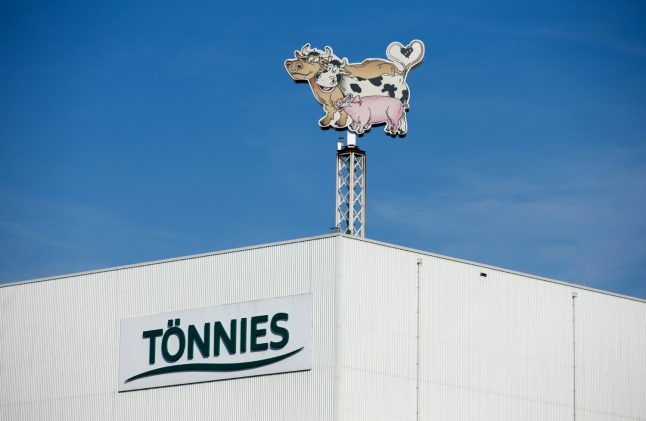More than 1,500 out of 7,000 employees have tested positive so far at the Tönnies meat processing plant in the western district of Gütersloh in the country's single biggest COVID-19 cluster to date.
Professor Martin Exner, a hygiene expert at the University of Bonn tasked by Gütersloh district to study the outbreak, told a press conference that the plant's air filtration system had contributed to the spread of virus-laden aerosol droplets.
READ ALSO: 'These clusters will continue to occur': Can Germany keep on top of new coronavirus outbreaks?
The ventilation system is aimed at keeping temperatures at a cool 6-10 degrees Celsius but continually recycles the same untreated air into the room, said Exner.
“This has so far been an overlooked risk factor” in the pandemic, he told reporters, warning that the finding would have “big consequences” for other slaughterhouses as well.
He stressed that the cooling system was just “one factor” to explain the rapid spread of the virus in the slaughterhouse, and that wearing face masks and keeping a safe distance were key to controlling the transmission.
Abattoirs have emerged as hotspots of coronavirus outbreaks in a slew of countries, including the United States, France and Britain.
In Germany, the outbreaks have shone a spotlight on the dire working conditions in abattoirs where low-paid employees, often from Bulgaria and Romania, work in close proximity and live in shared accommodation.
Now that air cooling systems were understood to play a role in the virus spread, Exner said discussions were needed to come up with solutions and possibly government-imposed regulations.
READ ALSO: What you need to know about Germany's new local coronavirus lockdowns
“The technology is there” to fix the problem, he said, pointing to high-performance mobile air filters that remove pollutants or the microbe-killing UV lights that are used in hospital air conditioning systems.
The virus cluster at the Tönnies slaughterhouse prompted authorities in Gütersloh and a neighbouring district to reimpose lockdowns on more than 600,000 people on Tuesday.
READ ALSO: More than 1,300 workers test positive: Germany fights to control coronavirus spread at meat plant
It was the first major setback since Germany began relaxing restrictions in early May.
At Wednesday's press conference, Gütersloh district commissioner Sven-Georg Adenauer said early indications suggested the cluster had not spread from Tönnies to the general population yet.
Of the 230 test results that have come back to date, 229 came back negative and one was unclear, he said, adding that it gave “a small glimmer of hope” that the outbreak was contained.



 Please whitelist us to continue reading.
Please whitelist us to continue reading.
Member comments